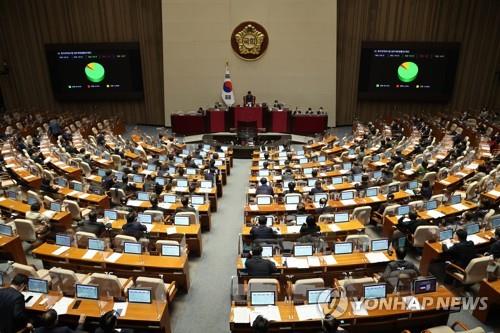- California Assembly OKs highest minimum wage in nation
- S. Korea unveils first graphic cigarette warnings
- US joins with South Korea, Japan in bid to deter North Korea
- LPGA golfer Chun In-gee finally back in action
- S. Korea won’t be top seed in final World Cup qualification round
- US men’s soccer misses 2nd straight Olympics
- US back on track in qualifying with 4-0 win over Guatemala
- High-intensity workout injuries spawn cottage industry
- CDC expands range of Zika mosquitoes into parts of Northeast
- Who knew? ‘The Walking Dead’ is helping families connect
National Assembly approves bill to raise ceiling on debt-ridden KEPCO’s bond issuance
The National Assembly on Wednesday approved a legal revision meant to raise the ceiling on bond issuance by money-losing state-run Korea Electric Power Corp. (KEPCO) in order to prevent a liquidity crisis at the firm and ensure stable power supply.
The partial revision allows KEPCO to raise its bond issuance ceiling by two to five times the sum of its equity capital and reserves.
In times of particular financial difficulties, KEPCO can issue bonds up to six times the current ceiling. In such case, the firm must seek approval from the industry minister, who then is obliged to immediately report the issuance to the related committee of the National Assembly.
The bill garnered 166 votes at the plenary session of the National Assembly, along with nine opposition and 24 blank votes.
The revised law is effective until Dec. 31, 2027.
The bill was first rejected on Dec. 8 mainly due to opposition from lawmakers of the main opposition Democratic Party who argued that raising the ceiling is not a fundamental solution to the company’s liquidity crisis.
But the bill passed in a renewed attempt on Wednesday amid concerns that electricity charges could increase at least three fold next year without a revision and consensus that there is no easy solution to KEPCO’s longstanding liquidity problem.

Lawmakers vote on a revision to the state-run Korea Electric Power Corp. (KEPCO) Act during a plenary session of the National Assembly in Seoul on Dec. 28, 2022. (Yonhap)
KEPCO has been struggling with huge losses on high fuel costs and limited electricity rate hikes.
According to the revised law, the industry ministry and KEPCO also must keep down the amount of bond issuance and try to improve its financial conditions, in relation to the new bill’s impact on the country’s economy and financial market.
Along similar lines, the revised act also allows another state-run energy firm Korea Gas Crop. (KOGAS) to raise the ceiling of its bond issuance up to five fold.








![trump[reuters]](http://www.koreatimesus.com/wp-content/uploads/2024/05/2023-06-10T235115Z_520439966_RC2NG1AXVQJW_RTRMADP_3_USA-TRUMP-copy-120x134.jpg)


